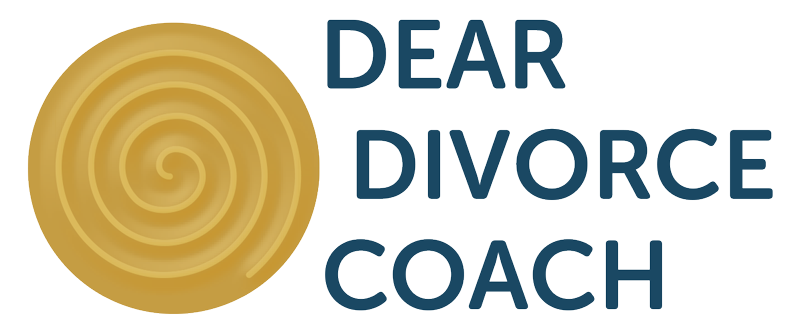Dear Divorce Coach:
I’m thinking about divorce a lot. Since you are divorced, what perspective can you offer, professionally and personally, about it?
– Contemplating Divorce Newbie

Dear Contemplating Divorce Newbie,
I’ve been doing this work full-time for about seven years now and although I’ve shared bits and pieces over time about my own experience, I haven’t put it all down in one place. Although I can’t suggest my own experience is universal, nor have I any interest in sharing all the details, I do think there is value in a community experience of shared awareness. I can face both my success and failures, I think, with the passing of time and experience.
My own divorce, and ultimately my experience of having a new and blended family, informs every step of the journey I take with my clients. I have been there, and I have done the work of figuring out a better path for me and, I hope, for my children too. I have created a system of incremental progress and decision-making for my clients based on hard-won lessons in my own life. It isn’t easy, ever, but sometimes it can be made simpler too. I want my clients to see, as soon as they can, how to take these steps for their own success and their child(ren)’s happiness. They can do better for themselves and their family by learning from my mistakes and successes. But my story is just that: it’s mine. However, I do think there are a few themes that are critical to any divorce process, and you should reflect prior to making any decisions about it, for sure. In that light, I’ve pulled together some of the key tenants I know for sure about divorce to share with you:
Financial and Legal Awareness and Planning Is Critical for Your Success
Whether you want a divorce or are told you are getting one, your financial awareness is critical to your success. If you didn’t have a hand in the finances previously, do it now. You should find a trusted financial advisor who can help you create a budget, project your financial future and who can work in conjunction with a legal advisor you hire to make sure you are able to negotiate fairly. This is simple but not always easy. Don’t allow difficult emotions to keep you from gaining the knowledge you need to succeed. Whether you were the instigator of divorce or surprised by it, you now have a responsibility to yourself and your children to learn what you need to succeed post-divorce. With the right tools, you can thrive no matter how difficult the experience now.
The Only One You Control in this Process is You
Your current spouse may become someone you don’t recognize whether you ask for divorce or they do. No matter what it’s always necessary to make a plan that does not rely only on your spouse’s goodwill. Whether negotiating finances or coparenting, you can hope for the best and plan for the worst. In an ideal world you will never need to worry about worst case scenarios, but my personal and professional experience has taught me that it is necessary to expect someone no longer your intimate partner to behave in ways you didn’t know they might. Make sure you have attentive legal counsel who can create good Agreements and hope you never have to look at them again. However, if a problem arises, you want the clear ability to seek recourse, as needed. In my personal and professional experience, litigation is rarely the best alternative to address family system matters. However, a good Agreement means litigation is less likely if you built in alternative dispute resolution alternatives and use techniques, like coaching, that can de-escalate you in the process.
Your Children Experience Divorce Too, And You Should Plan for It
Your children may know there was conflict in your marriage and data supports children do better without it. So, whether you decide to stay married or get a divorce, children do better without conflict. This means you have a responsibility as a parent, even if you are angry at your co-parent, not to expose the children to what are adult matters. I see my clients with children struggle with this during divorce. It was a big problem in my own divorce. Often, feeling that you are right or justified in your position convinces someone to involve their children in their feelings about the divorce or whatever happens to be talked about with the other parent. This is terrible for kids and if you don’t think you can keep your divorce conflict away from your kids, then work on your marriage instead. It means you aren’t likely ready to detach from your partner yet. When you are, it will seem much simpler to let go what isn’t yours to control.
Conversely, you cannot control what a high conflict spouse brings to you. What you can do, however, is let your kids know it isn’t for them, and not make them messengers to the co-parent toxicity. This is not an easy fix, at all, and may be something you do for years before the high conflict spouse stops targeting you. Litigation often only encourages high conflict spouses to continue their targeting and engagement. You will benefit more from good coaching and therapeutic help for you and your children and limit legal action to only those matters which cannot otherwise be resolved.
In the best-case scenario, you and your spouse can focus on loving the children in a family that looks different than it did but in which they still know mom and dad are a team where they are concerned. If that is impossible, at least keep the kids out of your conflict. Period. Getting there can mean compromise and negotiation during divorce as well as lots of your own work too, but the results of goodwill and the ability to give your children what they need last a lifetime.
You Will Find Out Your Real Support When Bad Things Happen
When you separate and/or divorce, you are likely to see friends and family choose sides. It’s important to remember that the people who can’t show up for you shouldn’t do so. Their own limitations make it impossible to be what you need, and you should gratefully protect and nourish those who help you cope during a time that is often filled with sadness and overwhelm. Ultimately, divorce is a moment when you learn who really stands with you and shedding those who couldn’t really show up is, ultimately, very good for you.
New Relationships Are Wonderful and Blending Families Is A Big Challenge
If you imagine a world post-divorce that is all roses and sunshine you may misunderstand. Your marriage may feel impossible to navigate and you know you are better off apart. However, that doesn’t mean your next relationship, no matter how steamy at the beginning, will solve all of those earlier problems. This is, in fact, a great time to take advantage of those coaching and therapeutic tools to figure out what led to the failure of your marriage, including your part in it, and what you may want to do differently and better next time. Yes, I’m suggesting none of us is blameless in marriage or divorce. We make choices as adults and the results of those choices bear fruit in our relationships. If we become dissatisfied in a relationship, or our partner does, it is a perfect time for self-reflection and couples counseling if possible. If the counseling doesn’t work, and you decide to divorce, that isn’t the end. Although it may feel easier to blame the other, take account of what you brought to the table too. Only when you do so can you hope for better next time. Starting a new relationship with new awareness will help your picker (of a partner) and when you are chosen too.
If you decide to blend your new partner with your current family, don’t expect that to be a bed of roses either. It’s a terrific time for more coaching or therapy as you navigate the road ahead. Learning to be a stepparent, for instance, is very different than the role of parent. It can feel as though you don’t matter at all. These feelings are normal and should be taken seriously. Don’t shy away from clarity in your role with your new spouse and learn to like your stepchildren too. I can’t overstate this last statement too much. We all find our own children challenging. Other people’s children, even those belonging to our intimate partners, can be daunting. Learning to love a stepchild may appear simple, but it’s a complex maneuver to join a family system in which no one, besides your partner, may even want you.
There is hope. Allowing the biological parent of the child to lead in the daily discipline and routines may help and allowing yourself to be more friend than authority figure does too. In some ways, it’s freeing to say, “Oh that sounds like a great idea. I hope your parents approve it,” than “No way can you do that!” In fact, both things may be true but if you aren’t the bearer of bad news you may find a child more willing to share details of their lives with you to their benefit and yours.
Divorce is complex and you have to put in real work to find success on the other side
In sum, divorce is not for the feint of heart or those of us who have trouble letting go of control. In fact, most of us who have divorced know there are things we would do differently or better if we could. Where I found success was when I put in the work on myself and assessed my role in my marriage and what I could work on to make my next relationship successful and take really good care of my kids.
We can also learn from research and experience what best practices serve us and our children in divorce. Pain is inevitable but great suffering is not. If you can choose to make thoughtful decisions at each stage of separation and divorce for you and your children, you can thrive on the other side of it.
I am there for my clients as a professional in my field who has not only survived a difficult divorce with children, broken friendships, and a need to rebuild a life, but also as someone who now lives a life she loves. I can and will share, always, my best practices to avoid mistakes, even some I made, that will hurt you and your children. I create personalized plans for my clients and, if I am working with a couple, I make sure to hold both individuals accountable to goals they set even when it’s hard to do so. I understand the pain and complexity and I help clients take specific steps, every day, to get to the other side of it.
I hope this helps. Please don’t hesitate to reach out to me,
